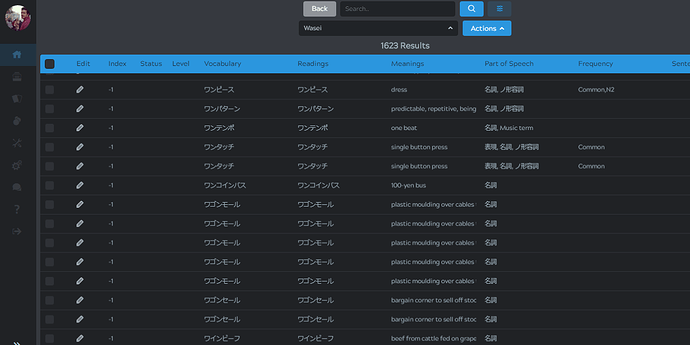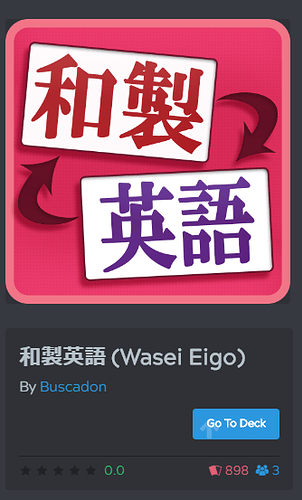Update 9/20/2020: Got rid of duplicates in deck.
What are Wasei Eigo (和製英語) and why study them?
Often, words taken into Japanese have similar/same meanings as they do in the original language. Since many loan words come from English, some people assume that knowing English is enough to understand all of these words. With Wasei Eigo, this is not true. Essentially, these are words that are formed using English (Eigo), but do not actually exist in English, or at least mean different things.
Here’s an example: if you play baseball, you might assume that “deddo booru” means “dead ball,” but it actually doesn’t! According to the MLB, in English it means “a ball that is out of play.” However, the Japanese meaning of “deddo booru” according to Jisho is a “pitch that hits the batter.” There’s an important difference between those two terms! There’s plenty of terms like this - “konsento” = “power plug” and not “consent”, “kanningu” = “cheating on a test” and not “cunning” - and it’s worth your time to focus on them!
This set will make sure that you aren’t missing wasei eigo in case you aren’t studying a Katakan set, or if the Katakana set doesn’t have it.
Does this mean I shouldn’t study a regular Katakana set?
No. Wasei Eigo will probably be some of the most difficult for an English speaker to understand just by hearing it, but many words taken with their meaning from English still sound very different in Japanese. You need to know those differences, and they aren’t something you can easily turn into a system (esp. when pitch accent comes into play). Besides, there are still plenty of katakana words that come from other languages, like “pan” (bread, from Portuguese).
Also, this set might come in handy for ESL teachers in Japan. As far as I know, it’s not obvious to Japanese speakers which words are wasei and which aren’t, so they’re bound to try and use one of these terms in English. While many words might make sense to you because they’re reasonable English constructions (ex. dead ball or guard man), it’s worthwhile to try and catch them when they appear.




 Even though I fully completed the Katakana 4.5k deck, there’s still good words missing there that are on this one
Even though I fully completed the Katakana 4.5k deck, there’s still good words missing there that are on this one 

 And yeah, I’m also going through the Katakana deck myself, so I’m just hoping these two don’t have too much overlap. It was actually inspired by me finding wasei in the katakana set and realizing that they might only have like 30 of them in there. Even if there is overlap though, it doesn’t hurt having a deck that will get you learning them sooner / reviewing them.
And yeah, I’m also going through the Katakana deck myself, so I’m just hoping these two don’t have too much overlap. It was actually inspired by me finding wasei in the katakana set and realizing that they might only have like 30 of them in there. Even if there is overlap though, it doesn’t hurt having a deck that will get you learning them sooner / reviewing them. I put my CSV through a sorter and like half the terms were duplicates! For a second I thought something had gone wrong with the thing I made to grab all these terms, but it turns out the problem is that Jisho itself has like 800 duplicates of different wasei words. In order to fix it on here, I had to delete all the words in the set and reupload the fixed version, so sorry if this gets rid of anyone’s progress! I mean this set is a day old though so hopefully you haven’t gotten too far?
I put my CSV through a sorter and like half the terms were duplicates! For a second I thought something had gone wrong with the thing I made to grab all these terms, but it turns out the problem is that Jisho itself has like 800 duplicates of different wasei words. In order to fix it on here, I had to delete all the words in the set and reupload the fixed version, so sorry if this gets rid of anyone’s progress! I mean this set is a day old though so hopefully you haven’t gotten too far? You get the idea.
You get the idea.





